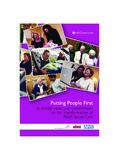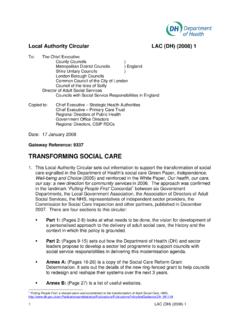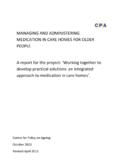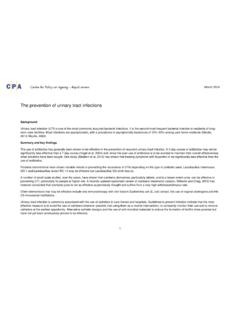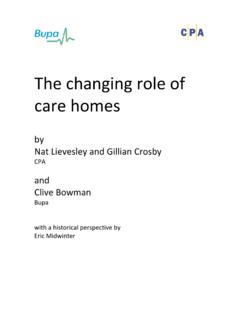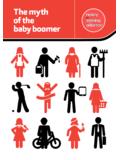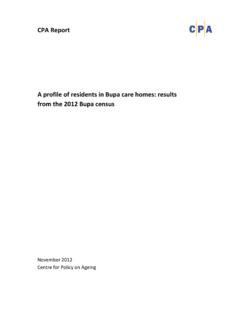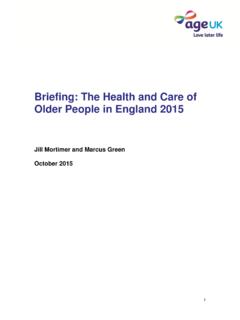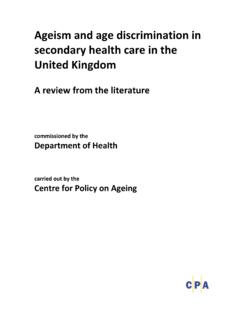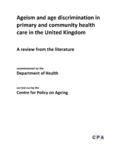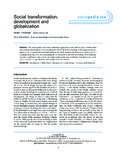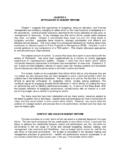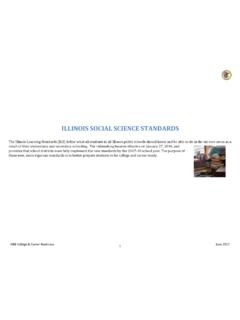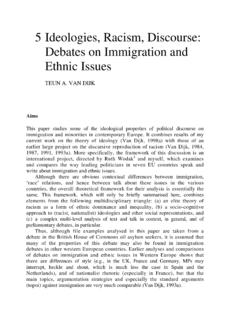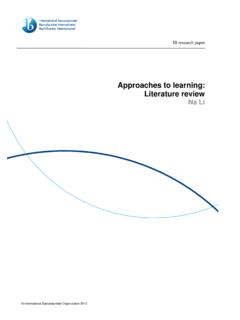Transcription of PERSON CENTRED APPROACHES TO CARE - CPA
1 1 PERSON CENTRED APPROACHES TO care THE CENTRE FOR POLICY ON AGEING (CPA) is working to advance PERSON CENTRED care for older people and all adults requiring support. The Single Assessment Process (SAP) and the developing Common Assessment Framework (CAF) for Adults are ways of delivering PERSON CENTRED care offering multidisciplinary assessment and care management processes. PERSON CENTRED APPROACHES are ways of commissioning, providing and organising services rooted in listening to what people want, to help them live in their communities as they choose. These APPROACHES work to use resources flexibly, designed around what is important to an individual from their own perspective and work to remove any cultural and organisational barriers. People are not simply placed in pre-existing services and expected to adjust, rather the service strives to adjust to the PERSON .
2 THE SINGLE ASSESSMENT PROCESS (SAP) FOR OLDER PEOPLE The Single Assessment Process (SAP) was introduced in the National Service Framework for Older People (2001), Standard 2: PERSON CENTRED care . This standard aims to ensure that the NHS and social care services treat older people as individuals and enable them to make choices about their own care . The requirement to develop a Single Assessment Process was based on the recognition that many older people have wide ranging needs and that agencies need to work together so that assessment and subsequent care planning are effective and coordinated. care is holistic and centres on the whole PERSON . The involvement of service users is fundamental to the implementation of this strategy. The Single Assessment Process therefore provides a PERSON CENTRED health and social care framework, which includes entry into the system, holistic assessment, care planning, care delivery and review.
3 SAP aims to make sure older people s needs are assessed thoroughly and accurately, but without procedures being needlessly duplicated by different agencies. SAP coordinates the assessment and shares that information appropriately between all relevant agencies not just health and social care . SAP is not just stages of assessment (contact, overview, specialist and comprehensive) and it is not just an assessment tool. Training and workforce development is critical to the effective delivery of SAP to ensure each practitioner has appropriate level of skills, knowledge and ability, relevant to their role within SAP. This requires the development of a common language; a shared value base; shared information systems, processes and protocols; multi agency learning opportunities; and collaborative working. Effective sharing of information between agencies is a vital element in joint working and there is a range of APPROACHES to implementing electronic SAP (e-SAP) across the country with emphasis on local solutions.
4 The Health and social care Integration Programme, an NHS Connecting for Health project, is working to enable the sharing of electronic records between the NHS and social care systems, subject to the individual's consent. briefings Centre for Policy on Ageing25-31 Ironmonger Row, London EC1V 3QP Telephone +44 (0)20 7553 6500 Facsimile +44 (0)20 7553 6501 Email Website 2 THE COMMON ASSESSMENT FRAMEWORK (CAF) FOR ADULTS The White Paper, Our Health, Our care , Our Say (January 2006) proposes a Common Assessment Framework for Adults. A common framework is designed to remove the artificial boundary of older age and provide continuity of a PERSON CENTRED approach throughout adult life, geared towards self-determination and planning for independent living. Currently, difficulties arise from having separate APPROACHES for adults, particularly for individuals with multiple needs who have to negotiate the different systems.
5 In developing CAF for adults it is important to build on experience to date from implementing the care Programme Approach for mental health, the Single Assessment Process for older people and PERSON CENTRED Planning for people with learning disabilities. The care Programme Approach is to be incorporated into a Common Assessment Framework for adults as a specialist assessment and the principles of PERSON CENTRED planning will inform personal health and social care plans. In particular, SAP provides a generic framework that can be applied more widely and a CAF for adults will build on the SAP model. The Department of Health (DH) notes that the momentum behind the implementation of SAP in local communities, including developing and implementing e-SAP solutions, represents a significant investment that must not go to waste. The Common Assessment Framework will retain the core features and properties of SAP: supporting seamless delivery of services across health and social care and other relevant agencies; avoiding duplication of information collection and procedures; a proportionate assessment according to an individual s level of need; a PERSON CENTRED assessment of needs feeding into a personalised care plan to support people.
6 And delivering greater transparency around the needs assessment process and agreed support POLICY IMPLEMENTATION Putting People First , a ministerial concordat issued in December 2007, establishes the collaboration between central and local government, the sector's professional leadership, providers and the regulator to put people first through a reform of public services, enabling people to live their own lives as they wish and promote their own individual needs for independence, wellbeing and dignity. This was reinforced by a DH circular to local authorities, Transforming social care , issued in January 2008, which sets out information to support the transformation of social care signalled in the Green Paper, 'Independence, Well-being and Choice' (2005) and reinforced in the White Paper in 2006. The Single Assessment Process is a PERSON CENTRED framework that links to Putting People First and other key areas of DH policy and practice including long term conditions with its emphasis on supported self care and personalised care plans to provide support for individuals with complex needs.
7 The Individual Budgets initiative as it develops can enhance and be integrated into SAP as the CAF for adults policy initiative moves forward. The DH has developed proposals on the practical workings of a CAF for adults and is holding country wide events in England to debate/consult on these proposals in the autumn 2008. Specific questions regarding, for example, the further development of the personalisation agenda, information sharing, and Individual Budgets will be part of the consultation. Alongside this consultation, the DH is launching a Demonstrator Site Programme (DSP) to pilot the proposals contained within the consultation document. 3 Demonstrator sites will test and evaluate innovative APPROACHES to effective information sharing between health and social services by a small number of sites. Each site will comprise at least one council with social services responsibility (CSSR) and at least one NHS Health Trust.
8 Partnerships will also include a range of other key local partners who have a role in supporting the local delivery of a multi agency approach to the care of individuals. Funding is available to support the sites over three years 2008-11. NATIONAL CAF/SAP LEARNING AND DEVELOPMENT RESOURCE The Centre for Policy on Ageing was requested by the DH to create and host an online resource for health and social care professionals implementing SAP. The materials focus on practice and change with respect to joint working, assessment and health/ social care conditions of older people. The resource, which is freely accessible, holds a wealth of material to assist multi agency working including a glossary of terms and a national discussion forum. The aim is to provide access to information, in all its various forms, that can be shared across localities, organisations and individuals to support work around assessments, share good practice and reduce duplication of effort.
9 The resource is continually updated to reflect new issues and practice. The glossary has been developed to explain some of the terms used by health and social care agencies when working with adults. Its aim is to assist multi agency training and help communication between staff from a variety of agencies. The glossary may also be useful to explain concepts and processes to individuals and carers practitioners work with, so supporting them in decision making and self management. To aid understanding and for easy reference, there are hyperlinks to related terms within the glossary. Each term on the online glossary contains links to provide further information on each topic through fact sheets, web sites, term-specific google searches and links to the CPA CAF/SAP resource. The CPA CAF/SAP resource contains information on and direct access to: learning and development materials, such as training packs; assessment tools; information sharing protocols; care plans and care pathways; videos/DVDs a national discussion forum examples of good practice and innovation organisations offering training and practical resources to develop workforce skills a glossary of health, social care and information technology (incorporating long term conditions) e-SAP implementation For further details of the CPA s work, contact the Centre s Director, Gillian Crosby, email Access government policy documents on ageing issues via CPA s website Selected reading lists are available to download from CPA s website August 2008
